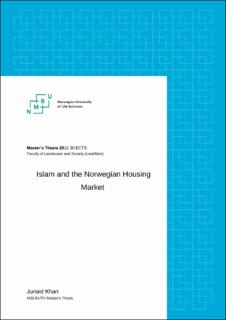| dc.description.abstract | Introduction:
The Islamic prohibition on interest-bearing loans has resulted in Muslims in Norway facing difficulties when it comes to homeownership and, in turn, impacts their housing choices (Borchgrevink & Birkvad, 2021; Peace Research Institute, 2021). However, those belonging to the Muslim faith in Norway are only second to the largest group of those adhering to Christianity (Borchgrevink & Birkvad, 2021). Eriksen (2013) noted that while under one-third of the total immigrants to Norway are from countries that are predominantly Muslim, “it is Muslim immigrants who find themselves at the center of the most heated political and social debates” (p. 1). However, the policies in Norway have trended toward equality for immigrants (Eriksen, 2013). According to Qureshi (2020), although Norway has a specific focus on homeownership as being critical to happiness and welfare, Muslim immigrants are much less likely to own their own than are non-immigrants. Therefore, globally and in Norway, Muslims do not realize inclusion in the financial system (Brekke, 2018). Although the immigrants who have been in Norway since the 1970s are not so tightly bound to their religious beliefs, the most recent arriving groups of Muslims have a much stronger attachment to their faith (Brekke, 2018). However, it is certain that Norway’s increase in Islamic immigrants is driving the need for new financial products (Brekke, 2018). Some countries, such as France do offer halal banking for Muslims, however, that is not the case in Norway (Shariabanking.com, 2022). In 2017, a Norwegian bank did begin offering loans that were based on Islamic principles, however, that initiative only involved testing the idea and it never went forward due to receiving negative feedback from customers who were not Muslim and some of the customers quit their relationship with the bank (The Local, 2017; Sputnik International, 2017). | en_US |

